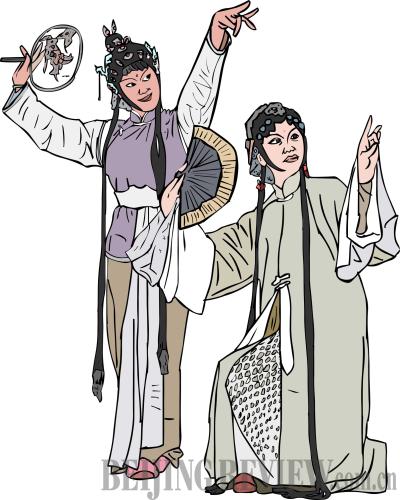|
 |
|
(LI SHIGONG) |
Foreigners in China often pursue their passions. One person may collect antique snuff bottles, while another may seek out a prized Qing robe. One of the most compelling pursuits I've encountered in Chinese culture is the Kunqu Opera.
Accompanied by music from the guqin instrument, the opera excels in illuminating gestures and the nonverbal movements that accompany language. It not only contextualizes each play in a historical period, but also articulates the relationship of one person to another in a different cultural milieu. The performers' costumes and the settings in the operas are beautiful, enhanced by the live traditional musical orchestra.
The presaging fluid movement of the actors on the stage, moving in a rhythm that belongs to another era, is calming and clarifying. The theater itself is small. Viewers sit close to the stage, creating an intimate dialogue with the audience. More young people than old attend; I would gather that Kunqu Opera is growing in popularity. Young Chinese women dress up, and cameras click during the performance so that spectators can document the show online. The performances are always sold out. I buy a seat in the front row, stage side, for 50 yuan ($7.9) on each Saturday of the month. That way I am assured a seat in this house of mirth.
The jewel in the crown of Kunqu Opera is The Peony Pavilion originally written by Tang Xianzu (1550-1616) of ancient China's Ming Dynasty (1368-1644). Scenes such as Disrupting the Lesson, The Dream Interrupted, Seeking the Dream, Walking Through the Garden and The Spirit Departs are most frequently performed. It tells the love story between Du Liniang, the daughter of a high official in the Song Dynasty (960-1276), and Liu Mengmei, a poor young man. Du embodies this love in a painting which Liu finds, through which love is expressed, preserved and then restored. Liu originally appears to Du in her dream. The play's appeal is in the truth of their love, her deep feelings and her willingness to die if her passion cannot be realized. Du does not exist without the love of Liu. The intense storyline appeals to young lovers, to those in love or who have lost their love.
Lisa See has recreated a contemporary version in her novel, Peony in Love, written after seeing the Lincoln Center production of The Peony Pavilion in NYC, in 2000. She said, "All women on Earth—and men too, for that matter—hope for the kind of love that transforms us, raises us up out of the everyday, and gives us the courage to survive our little deaths; the heartache of unfilled dreams, of career and personal disappointments, of broken love affairs."
As a foreigner I have felt the boundary between myself and the Chinese audience melt during opera, as the imaginative construct transcends our differences and transports us to another world. Kunqu theater performs scenes from a selection of plays in one evening, so the night is filled with contrasts. A typical scene will feature a clown in white makeup who mocks others on stage in a variety of exaggerated gestures. And, as in Shakespeare, from the mouth of the fool come truths we may not want, but need to hear. One learns the roles of the stock characters—the old servant, the mother, the clown, and the noble lovers.
Originating in Jiangsu Province, Kunqu Opera dates primarily from the Song dynasty (960-1279). Performances are spoken in the Suzhou dialect, which is why the theater signage is in both English and Chinese.
The stage is set in an original Ming theater within the Chaotiangong Palace complex. It was once home to a school, a Confucian temple, palace apartments and a large garden. The theater complex is in a charming courtyard setting, with the adjoining buildings all serving the performers and company staff. Visiting Kunqu is a journey back in time, and as a UNESCO national heritage, it preserves the past in the present.
The author is an American living in Nanjing
Email us at: liuyunyun@bjreview.com |
